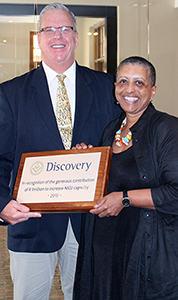Latest News Archive
Please select Category, Year, and then Month to display items
24 September 2024
|
Story Aimée Barlow
|
Photo Supplied
 Louzanne Coetzee, who made history by clinching South Africa’s second medal at the Paralympics, earning a bronze in the T11 1 500 m women’s final with a personal best time, received a warm reception when she recently returned home.
Louzanne Coetzee, who made history by clinching South Africa’s second medal at the Paralympics, earning a bronze in the T11 1 500 m women’s final with a personal best time, received a warm reception when she recently returned home.
The celebrated Paralympic bronze medallist Louzanne Coetzee returned home to a warm welcome at the Bram Fischer International Airport on 10 September 2024.
Family, friends, colleagues, Arista students, and media gathered to celebrate her remarkable achievement and show their support.
Coetzee – KovsieSport Coordinator of Parasport at the University of the Free State (UFS) – made history by clinching South Africa’s second medal at the Paralympics, earning a bronze in the T11 1 500 m women’s final with a personal best time. Her dedication and hard work have not only brought her personal glory but have also inspired many in her community.
Among those present to welcome her was Jerry Laka, Director of KovsieSport, who expressed his pride in Coetzee’s accomplishments.
"We as KovsieSport are so proud of our colleague Coetzee. It is amazing to see a product of KovsieSport achieving greatness on the world stage. She is truly an inspiration to us all," said Laka.
“I am so glad to be back, and to have Laka and my colleagues here. It means the world to me. Having Laka here shows his commitment to my career and ParaSport and his staff in general,” shared Coetzee, her gratitude evident.
She further expressed her appreciation for the support she received, stating, “I don’t have the words to describe how thankful I am for the support from the UFS community.”
Coetzee’s return is a proud moment for South Africa and the University of the Free State (UFS) community. Welcome home, Louzanne! Your achievements have made us all proud!
Neonatal Care Unit receives donation to expand capacity
2015-10-28
 With the best care and technology available,
the survival rate of premature
babies is about 85%. The neonatal intensive
care unit at the Universitas hospital can now
expand its capacity thanks to a donation of
R1 million by the Discovery fund.
From the left is Prof André Venter.
Head: Department of Paediatrics and
Child Health at the UFS, and mrs Ruth Lewin,
Head: Corporate Sustainability at Discovery.
|
The smallest people need the greatest care. This care is being provided by the neonatal unit in the Children’s Wing of the Universitas Hospital. This project of the University of the Free State (UFS), under the leadership of Prof Andre Venter, has led to several miracles regarding child health since its inception.
Now, thanks to a donation of R1 million rand from the Discovery fund, this unit can expand its capacity and treat more premature babies.
About 14% of babies in South Africa are born before the 37th week of pregnancy. These babies are born with a very low birth weight, and are in need of critical care. The neonatal intensive-care unit at Universitas Hospital is currently equipped to take care of about 14 premature babies at a time, from birth to discharge. However, because of the high incidence of premature births in the hospital’s service area, the unit needs about 45 beds.
The aim of the Children’s Wing Project is to expand the neonatal intensive-care unit in order to meet the demands of the hospital’s service area, which reaches as far as the Southern Cape. The Discovery Fund recently donated R1 million to the project, which will be used to expand the capacity of the neonatal intensive-care unit.
“With the best care and technology available, the survival rate of premature babies is about 85%. Without this, half of all premature babies would die,” says Prof Venter, Head: Department of Paediatrics and Child Health at the UFS.
“This is the reason why private and public partnerships, such as the one with Discovery, are essential to make specialised services available to the most vulnerable people. Discovery has made a significant contribution to the project without which we would not have been able to expand the capacity of the unit